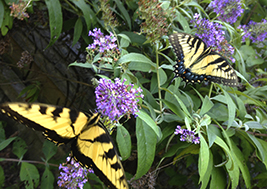“GARDENING REQUIRES LOTS OF WATER? — MOST OF IT IN THE FORM OF PERSPIRATION.” — LOU ERICKSON

- Trees & Shrubs
- Fertilize trees and shrubs for the last time.
- Mulch to conserve moisture, but do not pack around lower stems and trunks.
- Remove spent crape myrtle and buddleia blossoms to prolong the flowering period.
- Take semi-hard cuttings now from aucuba, azalea, buddleia, camellia, clematis, nandina, gardenia, holly and weigela.
- If shrubs need light trimming, don’t wait any longer; the tender re-growth could be killed back over winter.
- Watch for powdery mildew and treat as needed.
- Bagworms may be forming. Apply an insecticide labeled for bagworms. Bags may also be picked off and burned later in the season, if permitted in your area.
- Spider mites are another problem during hot and dry weather; treat with horticultural oil or insecticidal soap.
- Annuals, Perennials & Bulbs
- Lightly fertilize chrysanthemums every two weeks. Discontinue pinching your mums imid month so they will be able to develop flower buds for the fall.
- Continue to dead head your annual plants to encourage continued blooming.
- Get a second bloom from faded annuals by cutting them back by one half their height, then fertilize them with a liquid 5-10-10 fertilizer.
- Sow seeds of Hollyhocks, English Daisies, Foxgloves, Violets, Canterbury Bells, and Sweet William into the garden now for next year’s bloom.
- Fruits, Vegetables & Herbs
- Start seeds indoors for collards, spinach, cabbage, broccoli and cauliflower.
- Plant out successions of salad crops for continued harvesting throughout the summer.
- Inspect plants regularly—aphids, beetles, thrips and white flies are at their worst.
- Empty areas of the garden, where the crops have finished, should be replanted with either a fall vegetable crop, or a cover crop of clover or vetch to help control weeds. Cover crops can be tilled into the soil later, to add humus and nitrates to the soil.
- Herbs begin to mature this month—the best time to harvest them for peak flavor/scent is early morning after dew is dry.
- Side dress heavy feeders.
- Mulch to preserve moisture.
- Just for Fun!
- Check out Vermicomposting composting with earthworms. Great information can be found at HTTP://PUBS.EXT.VT.EDU/442/442-005/442-005.HTML
Back to This Month in the Garden
January February March April May June July August September October November December
